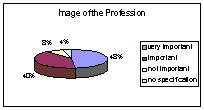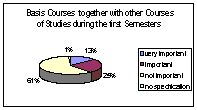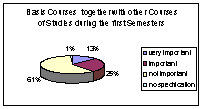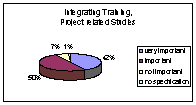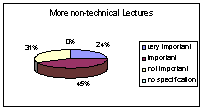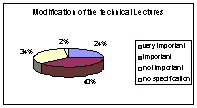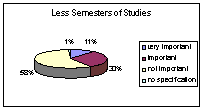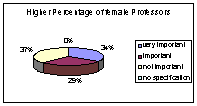Contents
Reflections to increase the Participation of Women in
Surveying Studies
by Gabriele Dasse, Germany
Personalities: Gerda Schennach
Women’s Access to Land - Experiences from Land
Administration Projects
by Agneta Ericsson, Sweden
Reflections to increase the Participation of
Women
in Surveying Studies
by Gabriele Dasse, Germany
The situation in general education for women in Germany is
good. There are more women than men with a high school diploma legitimating
the study at universities or at universities of applied science. For the
last years the number of women in surveying studies has be increased, but it
is still alarming low, specially the scientific personnel staff. In 1995 the
percentage of female students, who made a diploma was 22 % at universities
and 36 % at universities of applied science.
The participants in the World Conference on Science
for the Twenty-First Century: A New Commitment, assembled in Budapest,
Hungary, from 26 June to 1 July 1999 under the aegis of the United Nations
Educational, Scientific and Cultural Organisation (UNESCO) and the
International Council for Science (ICSU); stated the following concerning
science education and participation in science:
2.4 Science education
41. Governments should accord highest priority to improving
science education at all levels, with particular attention to the
elimination of the effects of gender bias and bias against disadvantaged
groups, raising public awareness of science and fostering its
popularization. Steps need to be taken to promote the professional
development of teachers and educators in the face of change and special
efforts should be made to address the lack of appropriately prepared science
teachers and educators, in particular in developing countries.
...
43. New curricula, teaching methodologies and resources, taking into account
gender and cultural diversity, should be developed by national education
systems in response to changing educational needs of societies. Research in
science and technology education needs to be furthered nationally and
internationally through the establishment and networking of specialized
centres around the world, with the cooperation of UNESCO and other relevant
international organizations.
....
3.3 Widening participation in science
78. Government agencies, international organizations and
universities and research institutions should ensure the full participation
of women in the planning, orientation, conduct and assessment of research
activities. It is necessary that women participate actively in shaping the
agenda for the future direction of scientific research.
79. The full participation of disadvantaged groups in all
aspects of research activities, including the development of policy, also
needs to be ensured.
80. All countries should contribute to the collection of
reliable data, in an internationally standardized manner, for the generation
of gender-disaggregated statistics on S&T, in cooperation with UNESCO
and other relevant international organizations.
81. Governments and educational institutions should identify
and eliminate, from the early learning stages on, educational practices that
have a discriminatory effect, so as to increase the successful participation
in science of individuals from all sectors of society, including
disadvantaged groups.
82. Every effort should be made to eliminate open or covert
discriminatory practices in research activities. More flexible and permeable
structures should be set up to facilitate the access of young scientists to
careers in science. Measures aimed at attaining social equity in all
scientific and technological activities, including working conditions,
should be designed, implemented and monitored.
...
During the national Congress INTERGEO in Wiesbaden two years
ago the Working Group "Women in Surveying" of the German
Association DVW distributed a questionnaire concerning the situation at
Universities.
Women were asked
"Which Changes do we need, to attract more Women to study
Surveying?"
83 questionnaires were completed. The results were as
follows:
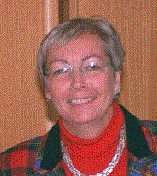 |
Gerda Schennach was born in 1956 and her interest
for natural sciences as well as her mainly technically minded family
might have influenced her to take up an education as surveyor.
After graduation at a commercial college she started
to study Geodesy first at the Technical University Innsbruck and
after two years at the Technical University of Vienna where she
graduated in 1980.
During her study she worked as a part-time assistant
at the Institute for Mathematical Analysis of the TU Vienna. |
The decision about the further professional proceeding had
to be made between staying at university for a scientific career and
starting a career in public administration. As the location of the job in
public administration was in her home town she entered on this way -
although one of the decision-makers in this institution "could not
imagine that a woman is able to run a cadastral office and I shall try to
prevent this". He did not succeed and exactly this person became her
strongest sponsor after a short time.
In 1983 Mrs. Schennach was appointed head of a cadastral
office in the Austrian Federal Office for Surveying and Metrology (BEV) - at
that time the youngest head of office ever before and the first woman in
Austria doing this job.
6 years in this office with male staff with a really
wonderful team-work were followed-up by 8 years heading another cadastral
office near to her husband's working location. It started again with a very
good male team and after few years a female apprentice was engaged and the
young cleaning-lady was given the opportunity for a technical re-training
program - very unusual at that time but already accepted by management,
works committee and colleagues.
Since 1998 Mrs. Schennach is responsible for international
affairs and participation in professional organizations in the headquarter
of the Federal Office of Metrology and Surveying (BEV).
Soon after Mrs. Schennach started her job in the cadastral
area of BEV some activities in professional associations occurred: She has
been member of the Working-Group for women’s equal rights in the Austrian
ministry of trade and commerce since 1984, contributing with empirical facts
from working in male teams and with male clients and giving support to other
women by making the running for incoming women. Things have changed a lot
and the Working Group is focusing now more on social items and personal
rather than on gender issues. The participation in FIG "Women in
Surveying" allows an exchange of information on an international level.
Membership in the Austrian Society for Surveying and
Geoinformation (ÖVG) and in the German Society for Surveying (DVW) combined
to the professional work on cadastre within BEV gave the right background
for the function as secretary of FIG Commission 3 from 1990-1994 and since
1994 as Austrian Delegate to FIG Commission 7 and in Working Group
"Cadastre 2014" as chairperson of a task-force on „Framework for
the determination of progress and effectivity of cadastral reforms".
Mrs. Schennach has been elected member of the executive
board of ÖVG in 1998.
Since 1998 Mrs. Schennach acts as Secretary General of the
Comité de Liaison des Géomètres Européens - European Council of Geodetic
Surveyors (CLGE) mainly on professional issues of private and public
geodetic surveyors.
First steps in her work in the headquarter of BEV were made
to establish an Austrian umbrella organization for Geographical Information
(AGEO). This multi-interest group was founded in 1998 and Mrs. Schennach was
elected Secretary-General in the foundation meeting and works with EUROGI as
an observer in this function.
Working in a technical profession has always been amazing
for Mrs. Schennach for it means working for the future and looking ahead.
She does not consider surveying to be a male profession and wants to
encourage girls to obtain a technical education and to contribute to the
development of the profession by emphasizing female accents.
Women’s Access to Land
- Experiences from Land Administration Projects
by Agneta Ericsson, Sweden
Introduction
Women´s access to land is a sensitive and huge topic to
discuss. The situation differs from one country to another and this article
does not lay claim on to be based upon scientific methodology. It is only to
be seen as observations based upon literature studies as well as own
experiences. The paper shows examples and quotations from some African and
Asian countries to highlight the situations and problems in the context of
women’s access to land and closely related issues.
The first observation made is that especially Female Headed
Families are vulnerable in the context of land and access to land. The next
observation is that the number of these families is continuously increasing,
especially in so called informal settlements. The third observation is that
there seems to be a serious difference between the views of women and those
of men. Interviews among poor people in an urban area in Lusaka illustrates
this observation:
"Women certainly regard themselves as major persons,
while men want to see married women as dependants in their custody;
Women claim joint ownership, while men see themselves as
sole owners of matrimonial property;
Women want pooled incomes and joint control, while men claim
control and ownership over not only their own but also their wives incomes.
Experiences from Land Administration Projects with a Gender
Component
Vietnam
The Vietnam-Sweden Cooperation Programme on Land
Administration Reform, carried out by General Department of Land
Administration (GDLA) together with Swedesurvey, supported by Sida, includes
a major component of gender awareness. The program includes 6 sub projects,
namely legislation, cadastral mapping, land use planning and mapping, land
valuation, LIS and program management. Each sub project is responsible to
contribute in one way or another to improve the gender situation in the Land
Administration Branch in Vietnam. From the starting point, the GDLA staff
was not aware of the fact that there were any problems of this kind in
Vietnam and the gender issues were not taken into account as a real problem.
Throughout the project these issues have been highlighted in different
aspect, and the gender awareness is increasing among the Vietnamese staff as
well as the Swedish technicians. E.g. the legislation project has realised
that the knowledge about the new land law is low among common people.
Information campaigns are therefore planned. The LIS project is designing a
system so that it can provide statistics about gender etc.
One study, "A study among Female Headed Households and
Land Tenure" , VIE 99/1-5, Ms. Nguyen Nhat Tuyen, concerns ethnic
minority women in the mountain areas. Some recommendations, among others,
are:
-
To change gradually the attitudes of men vs women’s
status, a wide dissemination is needed amongst the population about the
rights and responsibilities of both men and women to make them aware
about their possibilities to become a changing agent in the process of
the implementation of the land law. In the short term the staff of the
land administration branch are the pioneers in working with the
population to make them understand the objectives and the process of
LUCs. To achieve progress some short training courses should be designed
for the special needs of approaching low educational levels living in
isolation in mountainous high land areas. The courses should also target
the ethnic minority staff to work at the grass-root levels. Gender
issues are recommended to be included in the curriculum.
-
To raise awareness among men and women (especially
targeting the young, school children) about gender equity in appropriate
environment, such as in school, WU meeting, peasants meetings, during
festivities and market activities where there is a big audience. The
meeting organized by the WU at local level was found in many other
places as a good measure to make information reach women. This type of
meetings can also include other topics for women to discuss about their
concerns and help them to build the solidarity, self-esteem and
confidence. To attract women to attend the meetings it is good to have
some economic/health activities integrated in the programme. The law can
be included in these meetings, but the use of difficult terms has to be
avoided and rather give cases to discuss and find the problem and
solution by the women participants. The venue and the timing of the
meeting have to be acceptable by the majority of the target participants
and not constrain the traditions.
-
The land administration office has to be aware of the
risk of exclusion of one group of women from the right they have
according to the law. To ensure the gender equity is to ensure the right
to have access and control over the land that can support the living in
the special group of FHHs.
-
The land administration branch continues the work
started by a working group on ethnic minority issues and besides assigns
staff to up-date the information and progress of the work. This work has
to be done in cooperation with researchers, social scientists and women’s
studies experts to give a broad picture of the population that may be
affected while implementing the law. This data and research findings
would enable the policy makers to adjust the policy for the benefits of
the whole population.
-
The land administration office has to produce under law
documents to give guidance for implementation of the law.
Egypt
In Egypt a Gender Study is conducted within the
Egyptian-German Cadaster Project – EGCP – "Promotion of the
cadaster". From this study following findings are found:
The proportion of female landowners in one of the project
areas was quite high, 36 % but the management of land and land use of its
outputs rests with the male of the household. Female land owners only
marginally participate in ownership investigations because they are not
accustomed to dealing with formal procedures. In case of the husband’s
death, the widow has a guardian who looks after the land affairs. A woman
who inherits land from her father is more or less expected to hand over the
land to her brothers (the share of a female is one half of the share of the
male when both have the same relationship to the deceased). Female
illiteracy in Aswan Governorate is 65 % 1992 compared to men 50 %. The
female-headed households are estimated to be 17-20 %.
The project included a study of the gender situation among
the staff within the Egyptian General Survey Authority (ESA). Only 2 % of
women in ESA did not have formal education against 41 % of males who are
illiterate. In spite of relative high qualifications, women have less
remunerated positions.
Findings within the project, among others, were:
-
To appoint female staff to assist with the development
of material and messages which specifically address to female target
groups;
-
That selected female employees be trained to assist in
the informational campaigns to address female land owners;
-
The government institutions have successfully used
village women leaders to spread messages. With some training on
cadastral technical training procedures and legal aspects of land
registration they could become efficient intermediaries between ESA and
local women
Mozambique
Sida has supported a long term program in Mapoto with
Mozambique’s National Surveying and Mapping Department, (DINAGECA). The
program includes one identification and adjudication process. The customary
laws are very influential in Mozambique and the project took place in an
patrilineal system area where women only have access to the husband´s
family land. In order to speed up the identification process, the local
administrative structure together with DINAGECA decided that, in absence of
men, the women should be the title applicants, as they were the ones to work
in the field. Therefore, some of the titles were given to women, despite
prevailing customs in the area. An evaluation team, appointed by Sida, Sida
97/15, exposed that the women did not understand what it meant to hold a
title. Therefore, in reality, women did not assume the role of titleholder.
The conclusion is that the title will not give them control of the means of
production unless they accept this control and that they are prepared to
deal with the potential conflict with their husbands.
About Statistics
Below are some gender statistics aggregated
-
Even though females comprise more than 50 % of the
world´s population, they only own 1 % of the worlds wealth.
-
It is estimated that 70 to 80 % of refugees world wide
are women and children.
-
According to statistics of the population census in
Vietnam in 1989, female headed households make up a total of 27 % of all
households in Vietnam.
-
According to the 1990 Population and Housing Census in
Uganda, 45% of the female population have never been to school.
-
Female literacy rates are low: 20 to 50 percent of males
level.
There is a general lack of information about women’s
situation. It is therefore important to promote systems that can provide
gender sensitive systems. This should be considered when e.g. LIS systems
are created.
What Initiatives are necessary ?
To be able to improve women’s situation regarding access
to land, it is necessary to get an insight about the problems, not only in
developing countries, but all over the world. We all have a responsibility
to stress these issues. It has to do with what kind of world we would like
our children and grand children to take over (we might have daughters or
daughter-daughters and they may become widows or even get divorced!). It has
to do with attitudes, knowledge and power. We all have to take every
opportunity to stress these issues. We need to start from the moment a child
is born. We need to teach our children that all people have equal rights.
This has to continue in school.
Not only developing countries disfavour women. The societies
in Western countries are certainly not equal societies and market driven
economies are probably less gender sensitive than communistic states. Let me
give you an example from Vietnam. During the communistic era, the
constitution gave men and women equal rights. During the Vietnam War in
1970ies, women had to take over from men regarding labour, politics etc.
Therefore, women have been quite visible in all activates in the society.
Unfortunately, this trend is regressing, probably due to an emerging market
economy and the old feudal structure is taking over again.
I am sure that we all understand why everybody should have a
fair chance to have a place to stay in, earn their own living without being
dependent in an other person’s goodwill. The problem is to gain insight
and knowing what to do.
This article is an extract from a paper presented during the
International Conference on Land Tenure and Cadastral Infrastructures for
Sustainable Development in Melbourne 24 – 27 October 1999
(http://www.sli.unimelb.edu.au/UNConf99/sessions/session3/ericsson.pdf
).
If you are interested to support the activities of this very
important Task Force Group "Women’s Access to Land" please
contact:
Agneta Ericsson
Bygransvagen 6 D
S-806 49 GAVLE
SWEDEN
e-mail: [email protected]
|
Editor: Chair of the Task Force on Under-represented Groups in
Surveying
Ms. Gabriele Dasse, Kleinfeld 22a, D-21149 Hamburg,
Germany
Email [email protected]
Fax
+ 49 40 428 265 265
Tel. + 49 40 428 265 250
web site: http://www.fig.net/figtree/tf/underrep/tfunrep.htm
2/00, month of issue: June
© Copyright 2000 Gabriele Dasse.
Permission is
granted to photocopy in limited quantity for educational
purposes.
Other requests
to photocopy or otherwise reproduce material in this newsletter should be
addressed to the Editor.
|
|
























